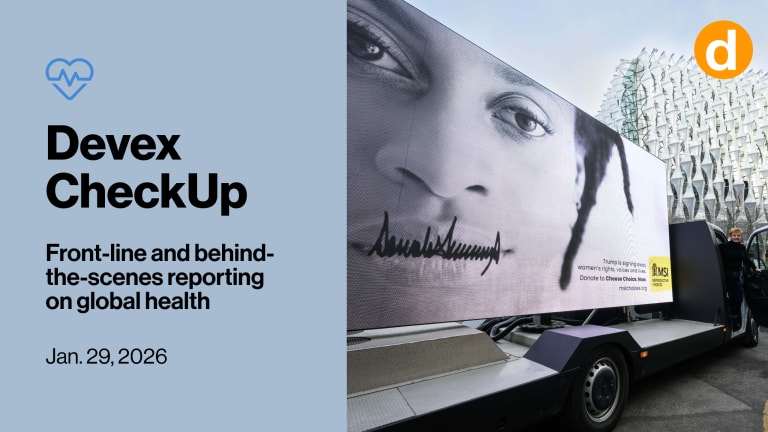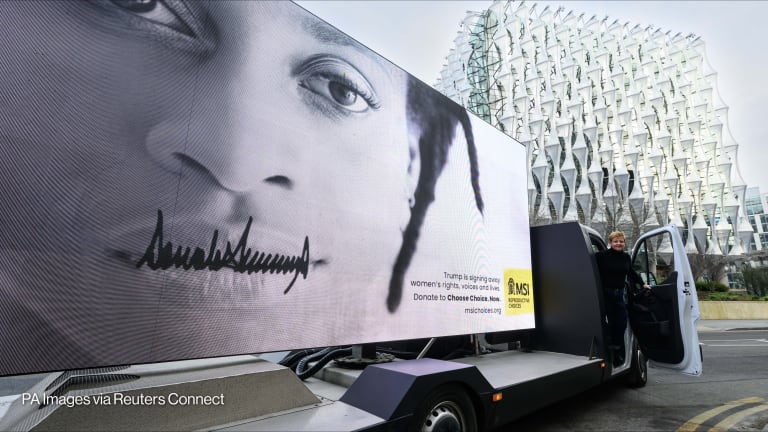'Global gag rule' impact already being felt, family planning advocates warn

The impact on women’s health of U.S. President Donald Trump’s decision to reinstate and extend the “global gag rule” is already being felt in a number of countries around the world, according to reproductive rights advocates speaking at a protest event held outside the White House.
The order seeks to prevent all non-U.S. NGOs that provide services or information relating to abortion from receiving U.S. government funding for any of their activities, is facing strong opposition from NGOs, high-profile donors including Bill and Melinda Gates, and also U.S. Senator Jeanne Shaheen.
Esther Vicente, president of the western hemisphere region for International Planned Parenthood Federation, the world’s largest sexual and reproductive health organization, said that even though the anti-abortion policy has yet to be finalized or approved by Congress, its effect was already being felt by organizations and women in the region.
“We have already begun to see funding and political will for sexual reproductive health and rights paralyzed in Puerto Rico and other countries in the [western hemisphere] region, even though the global gag rule is still undergoing revisions,” she said at a march demonstrating against the policy and also marking International Women’s Day.
IPPF members in Colombia, Puerto Rico, the Dominican Republic and Uruguay are reporting government funds being withheld or cut, she said. One organization in Puerto Rico said it will have to close its mobile clinic service, which provides family planning, reproductive health and education services to people living in remote areas.
“I think what is happening is governments are identifying the organizations that are not willing to agree to the global gag rule and taking actions against them in terms of stopping or limiting funding,” she said.
Read related stories:
► Trump issues first guidelines on 'global gag rule' implementation
► Anti-’global gag rule’ fund reaches $190M
► Europe raises at least $32.2M to plug 'global gag rule' shortfall
► Australia responds to the ‘global gag rule’
► NGOs scramble to safeguard programs in wake of Trump's expanded 'global gag rule'
President Trump reinstated the global gag order two days after taking office in January and last week offered additional policy guidance on the order, as Devex reported.
Although its reinstatement did not come as a surprise to the development community — the rule has been has been successively implemented by Republican presidents and then repealed by Democrats since it was first introduced by President Ronald Reagan in 1984 — Trump expanded the terms of the policy. According to the president’s January memorandum, the rule applies to all U.S. government global health spending, whereas previous administrations applied it only to family planning streams.
This could mean funding for non-family planning health work carried out by affected organizations — including HIV prevention, maternal and child health, immunizations and Zika prevention — could also be under threat, potentially equating to $9.5 billion in lost funding, IPPF told Devex.
Furthermore, the rule could contribute to at least 6.5 million unintended pregnancies, more than 2 million unsafe abortions, and 21,700 maternal deaths — in just Trump’s first four years in office, according to Marie Stopes International.
This comes alongside news the Trump administration reportedly plans to cut foreign aid spending by as much as 37 percent to offset increases in defense funding.
The global gag rule will affect women in developing countries most negatively and threatens to reverse progress made in improving maternal health outcomes, according to Dr. Carolyn Sufrin from Physicians for Reproductive Health, a global network of medical professionals working to improve access to reproductive health care.
“There is no question that this is targeting women in developing countries where they are already under resourced and rely on help from international organizations,” she said. “This global gag rule in its current, most regressive form threatens the progress that we’ve made in preserving and extending and improving the health of women and girls around the world,” she added.
As a result of recent restrictions on access to abortion clinics in parts of the U.S., she said the U.S. has already seen an increase in the number of women undergoing “self-induced abortions,” which regularly result in hemorrhages, life-threatening infections, and injury to internal organs. She said the newly reinstated gag rule would no doubt have similar consequences, but on a global scale.
“We’ve seen it for decades in countries around the world where abortions are illegal — it doesn’t mean women don’t have abortions. It means they induce them through very unsafe means,” she said.
Serra Sippel, president of the Center for Health and Gender Equity, which organized Wednesday’s protest, advised NGOs working on family planning to ensure they continue to help women who still qualify for abortions under the terms of the rule. Health care providers are permitted to advise patients about abortion in cases of rape, incest or where pregnancy poses life-threatening complications to the mother.
Organizations will also need to look to other donors for funding, Sippel said, and was encouraged by the recent news that several national governments, foundations and other groups had pledged $190 million to counteract the effects of the global gag rule after a meeting in Brussels earlier this month.
In January, Senator Jeanne Shaheen and Rep. Nita Lowey introduced the Global Health, Empowerment, and Rights (HER) Act, which seeks to permanently repeal the global gag order. The bill has attracted bipartisan support but is likely to face sharp opposition in Congress.
Stay tuned to Devex for more news and analysis of what the Trump administration means for global development. Read more coverage here and subscribe to The Development Newswire.
Search for articles
Most Read
- 1
- 2
- 3
- 4
- 5








